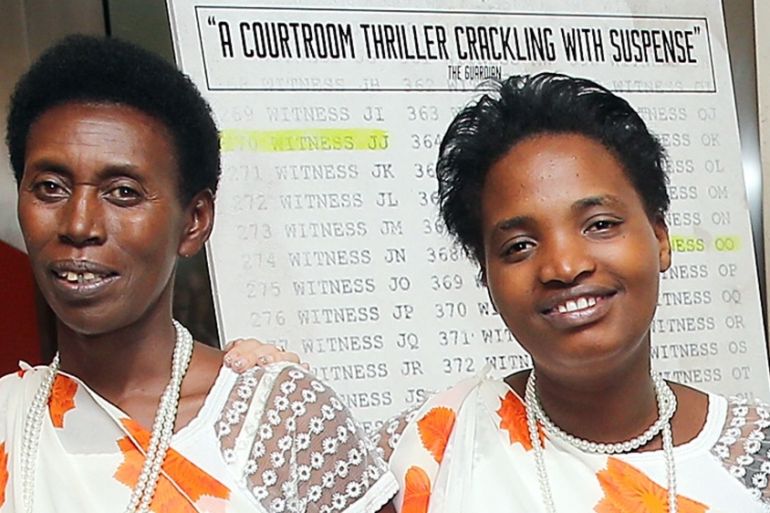How the courage of a few Rwandan women changed the world
The testimonies of Rwandan women helped establish rape as a war crime and paved the way for its prosecution.

Long before Twitter, Harvey Weinstein, and #MeToo, African women in a Rwandan village decided to speak up about rape. Their courage changed the world.
Twenty-five years ago, today marks the start of the Rwandan genocide. Over a few short months in 1994, up to a million people were killed primarily on the basis of their ethnicity. Soldiers and militia raped thousands of women. Though rape had been defined as a war crime, it had never been prosecuted. Like looting, rape was considered a spoil of war. It was accepted as inevitable and not recognised as the weapon of war it was. That was about to change.
Keep reading
list of 4 itemsEurope pledges to boost aid to Sudan on unwelcome war anniversary
Birth, death, escape: Three women’s struggle through Sudan’s war
Does Israel twist humanitarian law to justify Gaza carnage?
In 1995, when I arrived in Kigali as an investigator for the International Criminal Tribunal for Rwanda (the United Nations institution created to address the atrocities in Rwanda), it did not appear to be a promising venue for landmark court decisions.
The prosecutor’s office was virtually deserted. The few people on staff were away looking for witnesses abroad because of security concerns in Rwanda.
When police officers lent by the Dutch government arrived a few weeks later, they removed doors from hinges to use as desks and sat on upturned rubbish cans.
The court in Arusha, Tanzania was still under construction and investigations were barely under way when we got a rare call on the one unreliable phone extension in the office: it was the Zambian government letting us know they had arrested several people from our “most wanted” list. Since we did not have such a list, the call was quite a surprise.
One of those arrested, Jean-Paul Akayesu, was the mayor of a commune called Taba. In the communes, the mayor plays a crucial role in many aspects of the residents’ lives: he or she resolves disputes, decides who goes to school and gets civil service jobs, and is responsible for assigning required weekly community service.
Our investigation revealed that during the genocide, Akayesu had initially prevented killings but then had a change of heart and ordered all Tutsis to be killed. Within days, over 2,000 Tutsis in the area were massacred by their neighbours. Women and children sought safety in front of the bureau communal where Akayesu had his office.
Our indictment initially focused on the killings and establishing genocide. When Human Rights Watch brought widespread rapes in the commune to our attention, we sent female investigators and interpreters to see what we could find, but we still could not link the rapes to Akayesu. It was not until a witness testified during the trial that Akayesu was present during the assaults that we realised we might be able to hold him accountable for the rapes.
Several women in Taba had been following the trial closely on the radio. When they heard the testimony about the rape, they decided to tell their stories too. One of them, Victoire Mukambanda, sought shelter with her sister and young babies in front of the bureau communal where they were systematically assaulted.
While she was being raped, Akayesu told her assailant, “Never again ask me what a Tutsi woman tastes like.” Despite having just given birth, and being feverish with malaria, she was determined to give evidence.
Mukambanda, her surviving sister, and several other women overcame their fear of flying and the daunting prospect of appearing in a foreign court before berobed foreign judges who did not speak the same language.
She said of her decision “In speaking out, I hoped to restore my dignity and that of other women in my community who had suffered as I had.”
At the time, she did not realise that rapes had happened throughout Rwanda and that it is used as a weapon of war in many conflicts. She did not know her testimony would help set a precedent that would be used to prosecute rape in conflicts around the world and that her courage would encourage others to speak about their experiences.
She only knew that not speaking out was killing her slowly and by speaking out, she was able to move forward.
Since the 1998 decision, international criminal justice has developed rapidly. A permanent International Criminal Court was established in The Hague in 2002. Hybrid national and international courts were set up to address horrific crimes in Cambodia, Sierra Leone, and Bosnia. Fifty convictions for rape have been handed down in international courts.
Yet as we have seen in Myanmar, Iraq, the Democratic Republic of the Congo, Syria and elsewhere, rape is still all too often used as a weapon of war. Accountability will only meaningfully deter sexual violence when the threat of arrest is real.
The International Criminal Court has no ability to execute its arrest warrants and has limited jurisdiction. To make real progress, the international community must ensure accountability in places beyond the reach of international courts and require the arrest of indicted suspects. Governments must vigorously condemn and prosecute gender-based violence domestically, even in times of peace, to demonstrate that this behaviour will not be tolerated. Only then will the promise of the Akayesu judgment be realised.
![Jean-Paul Akayesu, handcuffed and surrounded by UN security personnel, arrives at the International Criminal Tribunal for Rwanda in Arusha, Tanzania on January 9, 1997 [File: Sayyid Azim/AP]](/wp-content/uploads/2019/04/f364cb077e43423da17a775a86b9b112_18.jpeg)
The views expressed in this article are the author’s own and do not necessarily reflect Al Jazeera’s editorial stance.
